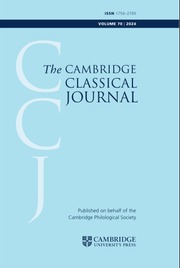Crossref Citations
This article has been cited by the following publications. This list is generated based on data provided by Crossref.
Drummen, Annemieke
2013.
A constructionist approach to the potential optative in classical Greek drama.
Glotta,
Vol. 89,
Issue. 1-4,
p.
68.
De Decker, Filip
2022.
The difference between the optative and the “modal” indicative in Homeric Greek: four case studies. Part 1: The optative.
Studia Linguistica Universitatis Iagellonicae Cracoviensis,
Vol. 139,
Issue. 3,
p.
157.


